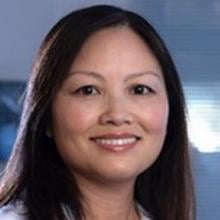- Featured institution and leadership
- What are your Accelerating Change in Medical Education project and goals?
- What are some recent accomplishments that would be of interest to others in the medical community?
- How has your work prepared you to respond to disruptions related to COVID-19?
- What do you think will change about medical education in the next five years?
- Can you share some strategies to maintain team engagement and well-being in this challenging time?
Each month, the AMA highlights institutions that are part of the AMA Accelerating Change in Medical Education Consortium to showcase their work with the consortium and innovations in medical education.
Featured institution and leadership
Khanh-Van Le-Bucklin, MD, MEd
Vice dean for medical education
UCI School of Medicine
Number of years in the consortium: 2 years
What are your Accelerating Change in Medical Education project and goals?
Our project is “#MDsToo: A Student Mistreatment Prevention Curriculum for Faculty and Residents.” The #MDsToo training introduces participants to the KIND (Knowledge-sharing. Inclusive, Nondiscriminatory, Developmentally-appropriate) framework for modeling positive teacher-learner interactions.
Using KIND as a mental tool for detecting mistreatment, faculty and residents identify, categorize, and reflect on video cases depicting real-world mistreatment scenarios. The goal of the curriculum is to sensitize participants to unconscious biases, microaggressions, and dysfunctional teacher-learner interactions that perpetuate mistreatment.
What are some recent accomplishments that would be of interest to others in the medical community?
To date, we have trained over 500 participants and presented our work at multiple national conferences. We recently published our first-year results in The Clinical Teacher. For schools that are interested in implementing the curriculum at their own institutions, we are happy to share training materials. Our video vignettes can be accessed on YouTube.
How has your work prepared you to respond to disruptions related to COVID-19?
Being a part of the [Accelerating Change in Medical Education] Consortium has been incredibly helpful as we navigate the disruptions related to COVID-19. The consortium provides professional development opportunities that are highly relevant to our work as education leaders, such as the crisis management sessions offered early in the pandemic. One of the greatest benefits of being part of the consortium is the camaraderie among educators who are facing the same challenges. We are able to share creative ideas and provide moral support to each other on a regular basis.
What do you think will change about medical education in the next five years?
As the world is becoming more connected through Zoom, social media and other communication platforms, shared educational programming between schools will become more commonplace over the next five years. For example, we have an elective focused on health policy and equity that operated locally and enrolled around 15-25 students each year. With conversion of in-person sessions to virtual conferences, we were able to open up some of our course offerings to other schools. This tripled attendance at some of the sessions, broadened the audience and enriched our discussions around these vital topics.
A couple years ago, we developed a program called Leadership Education to Advance Diversity–African, Black and Caribbean (LEAD-ABC), a mission-based program aimed at producing future physician leaders who are committed to addressing the health needs of African, Black and Caribbean communities. We are expanding this program to a partner school, with the intention that a core curriculum will be taught to student cohorts at both schools synchronously through virtual conferences.
With professors and students now accustomed to virtual instruction, I see medical education becoming less siloed and more interconnected between medical schools and across the health professions. The formation of the consortium as a means of bringing schools together longitudinally to think outside the box, design innovative curricula, and develop best practices for interschool implementation was really visionary and fits where the world is going in terms of medical education.
Can you share some strategies to maintain team engagement and well-being in this challenging time?
The past year has been extremely challenging, but also bonding for our medical education team.
One thing we did early in the pandemic was to create a group chat that we use regularly to check in on each other. During high stress times, we use the group chat to text jokes and funny memes. When things do not go according to plan, we openly share about them and find encouragement in each other.
As a team, we meet virtually once a week and have a “camera on” practice so we can really connect. We welcome children and pets that occasionally join us. While not as good as being in person, the face-to-face (though virtual) connection is essential to maintaining positive team dynamics.
Finally, as a team, we have adopted a “we’re doing our best” attitude. We are all managing not only our work, but also life events and challenges. When you know that your coworkers are also friends who support you, then you are able to come to work without the stress of having to pretend you are perfect. This self-compassion and team-compassion carried us through the early days of the pandemic, and continues to bond us as a team today.




